Interdisciplinary Undergraduate Research Studio Courses for 2018, 2019 and 2020
APPLICATION PERIOD EXTENDED: due November 24, 2017
PDF-CFP Application Information
Word Doc- Application Cover Sheet
Introduction
The Global Urban Humanities Initiative (GUH) studies cities by bringing together the arts and humanities, the interpretive social sciences, and the environmental design disciplines. GUH experiments with cross-disciplinary forms of pedagogy and research through the creation of team-taught courses. Each year GUH will sponsor an undergraduate interdisciplinary studio course set in a San Francisco Bay Area city.
GUH invites interdisciplinary two-person faculty teams to submit proposals for an undergraduate research studio course on cities and urban experience that will combine approaches from the arts and humanities and the environmental design disciplines.
The Interdisciplinary Undergraduate Research Studio is the centerpiece of a new Undergraduate Certificate in Urban Humanities currently under development and should reflect the goals and approaches of the Initiative. Background is available at globalurbanhumanities.berkeley.edu.
Summary:
Deadline: November 15, 2017 for 2018-2019 and 2019-2020 grants
Funding: $4,000 for travel and materials, GSI support, $5,000 summer salary, limited course relief
Eligibility: Teams including 1 faculty from CED and 1 from A&H (or interpretive social sciences)
Geography: San Francisco Bay Area
Post-course deliverables: Catalog/exhibition, course report
Support Provided
The Initiative will provide funding for a course for about 16 students, including funding for a GSI, $1,000 for guest speakers, $2,000 for materials and lab fees, and $1,000 for local travel costs.
GUH will also provide summer salary of up to $5,000 each for the two faculty members to support course preparation. If a faculty member is not able to teach the course as part of their regular course load and a replacement must be hired, course replacement funds of $13,500 will be available to one of the two departments participating in the course.
Eligibility and Selection Process
Proposals must be made by teams of two, including one faculty member from the Arts & Humanities Division or the interpretive social sciences, and one from the College of Environmental Design. Preference will generally go to ladder-rank faculty. The grant awards will be decided by Jennifer Wolch, Dean of the College of Environmental Design and Anthony J. Cascardi, Dean of the Arts and Humanities Division based on the quality and innovation of the proposal, its alignment with the goals and methods of GUH, and the relevant experience of the proposers.
Schedule
We are seeking proposals for 2017-2018, 2018-2019 and 2019-2020. Each year we will support a different team on a different topic. If you are flexible on the year you would teach the course, please indicate which years in your application
Focus of Study
GUH courses study urban form and urban experience. The Interdisciplinary Undergraduate Research Studio might address the history of a neighborhood, the nature of performance in urban space, the relationship of design and politics, the functioning of a park, the ways that literature or music shed light on cities, issues of race, gender, disability, etc. They key is that the methods of research and representation used should come both from the arts and humanities (or interpretive social sciences) and from architecture, landscape architecture, urban design, or urban planning.
Geographic Range
The purpose of the studio course is to examine a site or city in-depth and significant field work should be involved. Therefore, the proposal should explain how this will be achieved, particularly if the site is at some distance from the Berkeley campus. The site could range in size from a plaza to a neighborhood to a region, but the emphasis should be on intensive investigations in depth and the geographic extent should be appropriate to the methods planned.
Source of Funding
The Initiative is funded by the Andrew W. Mellon Foundation and has completed three years of sponsoring new courses, symposia, exhibitions, and publications. It is a part of a movement across more than a dozen universities funded by Mellon that is combining architecture and the humanities in new ways. Following three and half highly successful years of the UC Berkeley Initiative, Mellon has renewed funding for Fall 2016 through Spring 2020.
What is a “Studio” Course?
The studio form of pedagogy has a long tradition in architecture and urban planning, and the Global Urban Humanities Initiative has adapted this hands-on, experiential, fieldwork-based format so that students with no previous design background can fully participate alongside students in Architecture, Landscape Architecture and City and Regional Planning.
The “studio” course is defined by its location in a studio room, which belongs to a single class for 24 hours a day for the entire semester. In this room, an iterative, collaborative process of research, design, review by invited critics, and revision occurs. Students explore a field site in teams and represent information through a variety of means.
In the case of a GUH research studio, in contrast to a traditional architecture studio, students are not required to create design proposals, but instead create methods of representing their research on and interpretation of cities through media that may include photography, video, performance, diagrams, drawings, maps, and models, as well as writing.
In our experience, collaborative work among students is important to the success of the studio. Therefore, some team-based assignments should be included. Students should be given opportunities both to play to their strengths and to venture outside their comfort zones.
Each of our studios has resulted in a final group product of a book, catalog, and/or exhibition. Proposals should include a description of this final work product and proposers should be prepared to continue work on this product in the summer and semester following the course.
The GUH website, globalurbanhumanities.berkeley.edu and GUH publications in both hard copy (available from Susan Moffat) and online provide insight into our approach. For examples of past GUH studios, visit our Academic Program page and review the courses listed as “studio.” Also see Professor Margaret Crawford’s presentation on research studios.
Faculty who are not familiar with the studio method of pedagogy are welcome to apply in collaboration with College of Environmental Design (CED) faculty who can share their knowledge. Similarly, faculty from CED who may not be expert in humanities methods including close reading, formal analysis, discourse analysis, archival research and digital humanities approaches are encouraged to connect with arts and humanities and interpretive social sciences faculty to make a proposal.
Student Demographics
Global Urban Humanities undergraduate courses will include students from a wide range of disciplines. Students from architecture, landscape architecture and city planning will study collaboratively with students from anthropology, art practice, comparative literature, geography, history, music, performance studies, rhetoric, area studies, and so on. The course proposed should be explicitly designed to maximize learning among students from different disciplines and encourage cross-disciplinary inquiry.
Ways of looking at cities that the course might explore could include some of the following: close study of the artifact, text, or space; spatial thinking and representation; temporal/narrative thinking; exploration of individual experience and sense; analysis of systems and institutions; fieldwork and ethnographic approaches; archival research and historical approaches; the connection between interpretation and intervention, and design, making and performance as analysis.
Course Report
In order to help with curriculum development and reporting to the Mellon Foundation, a course report should be submitted in the semester after the course is offered. This will include the syllabus, course roster, examples of student work products including images, and reflections on pedagogical and methodological lessons learned.
PROPOSAL COMPONENTS
Proposers are encouraged to talk with GUH Project Director Susan Moffat before submitting. Proposers should fill out the application Cover Sheet with brief answers. In addition, proposers should submit a narrative application formatted as a Word document that includes a description of all of the following:
I. Proposers
A. Proposers, their disciplinary backgrounds, titles and intellectual interests
B. Proposer experience in interdisciplinary teaching and research
C. Proposer experience managing fieldwork with students, if any
II. Course Concept
A. Research site and questions to be posed
B. Key questions and themes to be addressed
C. Cross-disciplinary issues to be explored
D. Collaborating local partner organization/local experts (if known); please list
individual names and specify whether relationships are existing or to be developed
III. Pedagogical Approach
A. Methods to be employed, assignments, and student work products required
B. Any need for technical workshops or training for students and faculty
C. Techniques to encourage cross-disciplinary learning among students
D. Explanation of the uses of team and individual work
IV. Course Outline
A. Course title and short description
B. Schedule (schematic)
C. Representative readings
D. Representative assignments (team or individual?)
E. Final group product (i.e. catalog, exhibition, etc.)
F. Proposed budget (include local travel costs, materials etc.)
V. CV for both proposers (can be a separate PDF document)
VI. Statement of whether course replacement funds will be needed, with brief explanation.
Letter of support from your chair will be requested before grant is awarded. Please discuss this opportunity with your chair before submitting application.
HOW TO SUBMIT
The proposal should be submitted as a single Word document (not a PDF). CVs should be submitted as separate files (PDFs ok). Please name proposal files as follows: Sitelocation_Year to be taught_Last Names of Proposers
Please email proposals as attachments to Susan Moffat, GUH Project Director at susanmoffat@berkeley.edu. You will receive an email confirmation of receipt.
Questions about the application process should be directed to GUH Project Director Susan Moffat at susanmoffat@berkeley.edu.
